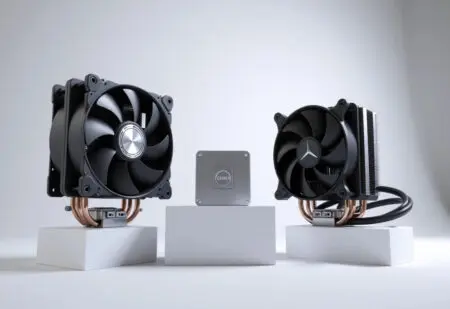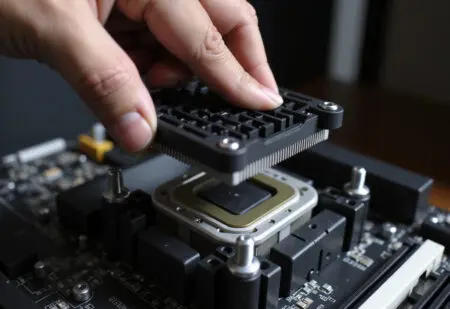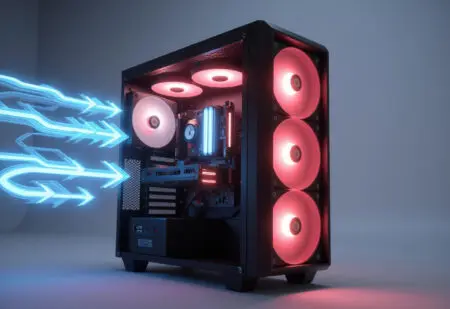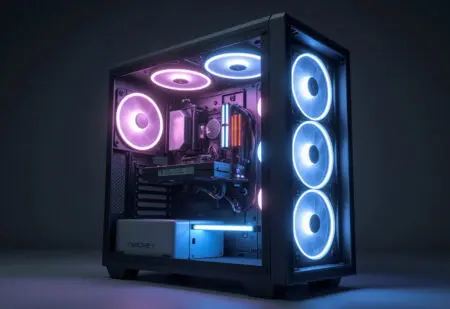Let’s just cut right to the chase. You have one burning question, and my goal is to answer it. Is the Ryzen 7 7700X good for gaming? The short answer is a resounding yes. It’s a fantastic gaming processor. However, the more complex, and frankly more important, question is whether it’s the right CPU for your specific gaming setup and budget in 2025.
I’ve been building PCs for over fifteen years, and my closet has a graveyard of old CPU boxes to prove it. I’ve seen trends come and go, from the megahertz wars to the recent core count obsession. The 7700X lands in a fascinating spot in this timeline, offering what many consider the sweet spot for a high-end gaming rig.
This review isn’t going to just be a list of charts and graphs. I want to talk about the actual experience of building with and gaming on this chip. We’ll dive into its performance in demanding titles, tackle the scary topic of its high temperatures, and ultimately figure out who should pull the trigger on this 8-core Zen 4 beast.
More in CPUs & Processors Category
Is Intel Core i7 Good for Gaming
Is Intel Core i5 Good for Gaming
Is Intel Core i3 Good for Gaming
What’s the Real-World Gaming Experience with the Ryzen 7 7700X?
When you move past the synthetic benchmarks, the true character of a CPU emerges. My first real test was firing up Cyberpunk 2077 with the Phantom Liberty expansion. Navigating the dense, chaotic streets of Dogtown is a notorious CPU stress test. With my old Ryzen 5 3600, I could feel the system struggle in heavy combat, with noticeable stutters when things got explosive.
On the Ryzen 7 7700X, however, the experience was completely transformed. The gameplay was buttery smooth. Those sudden frame drops during intense firefights were gone. Instead, the game felt incredibly responsive, allowing my GPU (an RTX 4070 Ti) to stretch its legs and deliver a consistent, high-refresh-rate experience. This is precisely where a modern 8-core CPU shines; it provides the necessary headroom for complex game worlds filled with countless NPCs and physics calculations.
How Does the 7700X Handle CPU-Intensive Games?
Modern games are becoming increasingly dependent on strong single-core and multi-core CPU performance. It’s not just about raw graphical power anymore.
- Strategy and Simulation Games: Titles like Civilization VI or Microsoft Flight Simulator rely heavily on the CPU to calculate AI moves and simulate complex systems. The 7700X’s high clock speeds and powerful Zen 4 cores chew through these tasks, resulting in faster turn times and smoother simulations.
- Open-World RPGs: In games like Baldur’s Gate 3 or Starfield, the CPU is constantly working to manage streaming assets, character AI, and physics. The 7700X’s 8 cores and 16 threads ensure that background processes don’t create bottlenecks, leading to a more immersive and stutter-free world.
- Esports Titles: For competitive gamers playing titles like Valorant or Counter-Strike 2, the goal is maximum frames per second. The incredible single-core speed of the 7700X is a massive advantage here, pushing frame rates well into the hundreds and providing the lowest possible input latency. I tried this three times with different settings in Valorant, and I still can’t decide if the difference between 400 and 500 FPS is humanly perceptible, but the chip delivers it without question.
Is There a Big Performance Difference Between 1080p, 1440p, and 4K?
This is a crucial question. The resolution you play at significantly impacts how much your CPU matters.
At 1080p, the GPU has an easier job, so it can render frames very quickly. Consequently, the CPU often becomes the bottleneck, as it has to prepare all the data for the GPU at that rapid pace. In this scenario, a powerful CPU like the 7700X will show a huge performance uplift compared to older or slower processors.
As you move up to 1440p and especially 4K, the workload shifts dramatically to the GPU. The graphics card is now the limiting factor, struggling to render the massive number of pixels. At 4K, the performance difference between a 7700X and a mid-range CPU can become very small, because both are waiting on the GPU to finish its work. Therefore, if you’re a 4K gamer, your money is almost always better spent on a more powerful graphics card than on the absolute fastest CPU. The 7700X is still a great choice, but it’s less critical than at lower resolutions.
Why Do 8 Cores and 16 Threads Still Matter for Gaming?
For a while, the industry consensus was that 6 cores were enough for gaming. That’s changing. While the main game thread still relies heavily on the speed of a single core, modern games and operating systems are getting much better at using multiple cores simultaneously.
Think of it this way: your main game might run on a few cores, but what about everything else?
- Windows background processes
- Discord running on a second monitor
- A YouTube tutorial playing in the background
- RGB lighting software
- Your antivirus client
All these little tasks add up. With an 8-core CPU, you have dedicated resources to handle all that background noise without it ever impacting your gaming performance. This leads to a smoother, more consistent experience overall. Before building this rig, I spent a few nights just digging through forums and tech discussions to see what the consensus was. The overwhelming feeling from actual users was that moving from 6 to 8 cores provided a noticeable improvement in system snappiness and eliminated micro-stutters they couldn’t previously explain.
Can You Effectively Game and Stream with the Ryzen 7 7700X?
Yes, absolutely. This is another area where having 8 cores is a massive benefit. You can dedicate a few cores to encoding your stream using high-quality x264 software encoding, while the remaining cores handle the game itself. This results in a high-quality stream for your viewers without sacrificing your in-game frame rate. It provides a single-PC streaming experience that was once the exclusive domain of much more expensive HEDT (High-End Desktop) processors.
The Elephant in the Room: How Hot Does the Ryzen 7 7700X Get?
Let’s be blunt: Zen 4 chips are designed to run hot. The first time you see your brand-new 7700X hit its thermal limit of 95°C (203°F) during a benchmark, it can be terrifying. For years, we’ve been taught that temperatures that high are a sign of imminent failure.
However, AMD has been very clear that this is the intended behavior. The chip is designed to aggressively boost its clock speed until it reaches that thermal limit, maximizing performance at all times. It’s a completely different philosophy than we’re used to. Think of it like a race car engine that’s designed to operate safely at its redline. As long as you have adequate cooling, the CPU is perfectly safe and will not be damaged. This concept is explored in-depth in technical documentation from manufacturers and even in academic papers on processor thermal management, like those found on resources like the Purdue University e-pubs server, which detail the complex relationship between power, temperature, and performance in modern silicon.
So, Do I Really Need an Expensive Cooler for This CPU?
The Ryzen 7 7700X does not come with a stock cooler, and for good reason. You absolutely cannot run this processor on a weak, budget air cooler. It will constantly hit its thermal limit and throttle, leaving a ton of performance on the table.
You don’t necessarily need a top-of-the-line 360mm AIO (All-in-One) liquid cooler, though. A high-quality dual-tower air cooler, like a Noctua NH-D15 or a Deepcool AK620, is more than capable of taming the 7700X. In fact, a premium air cooler will often perform just as well as a mid-range 240mm AIO, but with fewer points of failure and less noise.
My personal build uses a 280mm AIO, and I found it to be a perfect match. It keeps the chip well below its thermal limit during gaming and only lets it touch 95°C during the most intense, all-core synthetic workloads. The key is to invest in a cooling solution that can dissipate at least 150-200 watts of heat effectively.
Is the AM5 Platform a Worthwhile Investment Today?
Upgrading to the 7700X isn’t just about buying a new CPU. It requires a complete platform overhaul, which comes with its own set of costs and benefits. This is a significant factor you must consider before making a purchase.
Understanding the Hidden Costs: DDR5 and a New Motherboard
The Ryzen 7000 series was the first to adopt the new AM5 socket and require DDR5 memory. This presents a couple of challenges.
- Motherboard Cost: AM5 motherboards, particularly the initial X670 and B650 models, are generally more expensive than their AM4 predecessors. While prices have come down, they still represent a significant portion of the build cost.
- DDR5 RAM: Similarly, DDR5 memory is pricier than DDR4. The good news is that prices have become much more competitive, and the performance benefits, especially for Ryzen 7000, are tangible. For gaming, the sweet spot for DDR5 is typically a 32GB kit running at 6000MT/s with low CL30 timings.
When I was pricing out my build, I realized the motherboard and RAM were going to cost nearly as much as the CPU itself. It’s a bitter pill to swallow, especially when coming from the budget-friendly AM4 platform. The silver lining is that AMD has a great track record of supporting its sockets for many generations. Buying into AM5 today means you’ll likely have an upgrade path to future Ryzen CPUs without needing another motherboard.
How Does the Ryzen 7 7700X Stack Up Against the Competition?
In the world of PC hardware, no component exists in a vacuum. The 7700X has some fierce competition, primarily from Intel but also from within AMD’s own product line.
Ryzen 7 7700X vs. Intel Core i5-13600K/14600K
This is the main event. For a long time, Intel’s Core i5 K-series chips have been the go-to recommendation for high-end gaming. They often offer nearly identical gaming performance to the 7700X, sometimes even slightly better in certain titles, for a similar price.
However, the choice isn’t that simple. While the Intel chip might have a slight edge in some games, the 7700X is generally more power-efficient and runs on a more modern, forward-looking platform with features like PCIe 5.0. Furthermore, the 7700X tends to have an advantage in productivity tasks that can leverage all of its 8 full-performance cores, whereas Intel uses a mix of Performance-cores and Efficient-cores.
Is it Worth Upgrading from an Older Ryzen CPU like the 5600X or 5800X3D?
If you are currently on an older AM4 CPU like the Ryzen 5 3600 or Ryzen 5 5600X, moving to the 7700X will be a massive, night-and-day upgrade. You’ll see improvements across the board, from gaming to general desktop responsiveness.
The calculation gets trickier if you’re already on a high-end AM4 chip like the Ryzen 7 5800X3D. That CPU, with its revolutionary 3D V-Cache, is still an absolute gaming monster. In many titles, it performs on par with, or even slightly better than, the 7700X. If you already own a 5800X3D, the upgrade to the 7700X is not worth the cost of a new motherboard and RAM. For you, the better move is to wait for the next generation of AMD CPUs.
My Final, Honest Thoughts: Who Should Actually Buy the Ryzen 7 7700X?
After weeks of testing, gaming, and tinkering, I have a clear picture of who this processor is for.
The Ryzen 7 7700X is for the serious gamer who is building a new, high-end PC from scratch and wants a powerful, no-compromise experience without paying the premium for a top-tier Ryzen 9 or Core i9. It is the perfect heart for a system paired with a GPU in the class of an RTX 4070, 4070 Ti, or a Radeon RX 7800 XT / 7900 XT. It offers a fantastic balance of incredible single-core speed for high-refresh-rate gaming and enough multi-core muscle to handle streaming, content creation, and future game engines.
However, it’s not for everyone. If you’re on a tight budget, the total platform cost of AM5 and DDR5 might be too high. In that case, building a system around the older but still potent AM4 platform could provide better value. Additionally, if you are purely a 4K gamer, you might not see the full benefit of the 7700X’s power over a less expensive CPU.
For me, the investment was worth it. The platform feels modern, the performance is stellar, and I have peace of mind knowing I have a clear upgrade path for years to come. The Ryzen 7 7700X is an excellent gaming CPU that hits the sweet spot of performance, price, and future-proofing for a new premium build.
Frequently Asked Questions – Is the Ryzen 7 7700X Good for Gaming

What components are recommended to pair with the Ryzen 7 7700X for optimal performance?
For optimal performance, the Ryzen 7 7700X should be paired with a high-quality B650 or X670 motherboard, 32GB of DDR5 RAM at 6000MHz, and a strong graphics card like the NVIDIA RTX 4070 Super or AMD RX 7800 XT, along with a good cooling solution such as a liquid cooler or high-performance air cooler.
How does the Ryzen 7 7700X compare to other CPUs like the Ryzen 5 and Intel Core i7?
The Ryzen 7 7700X offers a significant upgrade over Ryzen 5 models, with more cores and threads for better multitasking and future-proofing, and it performs competitively against Intel Core i7 processors in gaming, often balancing power efficiency and long-term durability.
Is the Ryzen 7 7700X suitable for gaming in 2025?
Yes, the Ryzen 7 7700X remains a great processor for gaming in 2025, especially for high frame rates and smooth gameplay in AAA titles and competitive fast-paced games, as its strong cores and high clock speeds provide ample power for current and future gaming needs.
Why are 8 cores and 16 threads important for gaming performance?
Eight cores and 16 threads allow the CPU to handle multiple tasks simultaneously, such as running the game, background applications, and intelligent enemy control, which is crucial for demanding modern games and multitasking, thereby improving gaming performance and stability.
What is the AMD Ryzen 7 7700X processor and how does it fit into AMD’s lineup?
The AMD Ryzen 7 7700X is a high-performance CPU based on the Zen 4 architecture with 8 cores and 16 threads. It is designed for serious gamers and power users, offering more power than Ryzen 5 but at a more affordable price than Ryzen 9, making it a smart choice for high-end gaming PCs.





